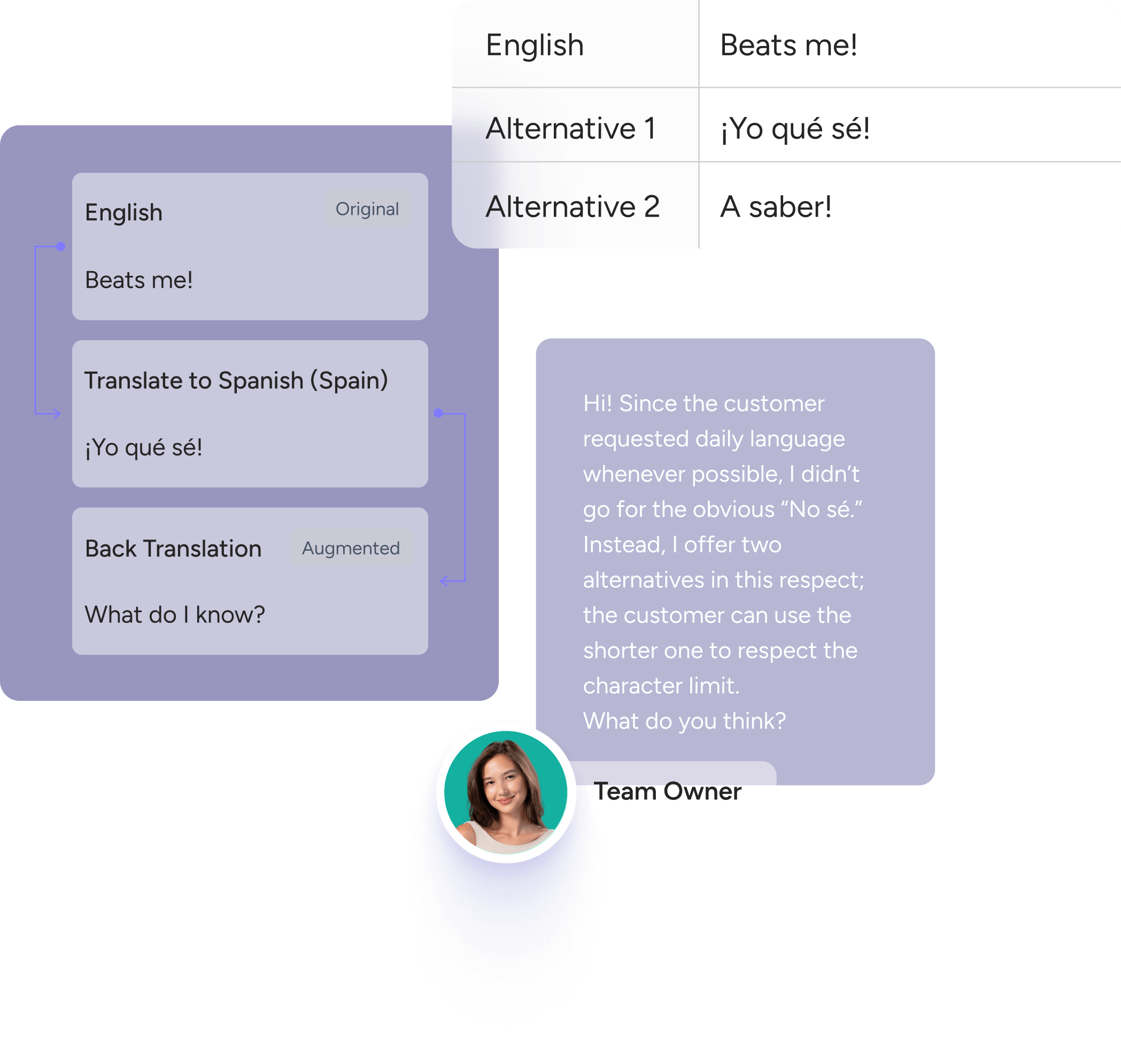5 Examples of Successful Website Localization

Website localization is the process of tailoring a website to a specific target market. This can involve localizing content into a different language, adapting web design elements to accommodate cultural differences, and more. Website localization is crucial if your objective is to reach a wider audience and tap into new, unexplored markets.
To appreciate the importance of website localization in expanding your business, let's take a look at five outstanding examples of startups that have boosted their business growth with thriving website localization.
1. Lyft
Lyft is a ride-sharing service that was founded in 2012. First, the company started its journey in the US market but quickly realized the importance of customized user experience. Lyft localized its website and app into Spanish, French, and Portuguese to better serve and engage with more users.
Lyft took the origins of its drivers and riders as the basis for its expanding strategies. Since Spanish was the second most commonly spoken language among them, the company started with localizing into Spanish. Eventually, it customized its website for a greater user experience for its drivers and riders, also localizing the app, in Spanish, French, and Portuguese.
As part of the localization process, Lyft also adapted its payment system to work with local currencies, and customized its policies according to country-specific law and regulations. Here is an example of how the company localized its services on its website for US and Canadian drivers:
Lyft’s efforts paid off, crafting a successfully localized website and app for its users. Consequently, the company improved its services and increased revenue over the years, setting a good first example for this blog article.
2. Airbnb
Airbnb is a popular online marketplace where people list and book properties all around the world. Right from the start, the company realized that localization would play an important role on the road to international success. Consequently, Airbnb ensured the seamless localization of its website into various languages.
The company knew that user experience was key to impress broader audiences, so it adapted its user interface, such as visuals, layouts, and even color schemes to specific markets. For example, the app and website’s suggestions regarding the must-see places, restaurants, or events are all catered to special locations of the customers, creating a sense of individual service effort instead of a mass market implementation.
Another really effective localization strategy that Airbnb implemented was localizing and giving place to user generated content (UGC). The company used guest reviews, photos, and videos on its social media, app, and website, and even integrated them into its marketing campaigns.
Below is an example of how Airbnb localized its user reviews for Spanish speakers:
Taking one step further, the company also strived to comprehend each market's needs and partnered with local organizations. These efforts to engage with the targeted audience transformed Airbnb into a global phenomenon.
3. Duolingo
Duolingo, founded in 2011, is a famous app for learning languages. The company has come to realize it needs to localize its services to achieve business results in international markets. Moreover, the company adapted its content according to the prevailing hot topics or traditions of different cultures. It has launched a new language campaign or given out extra points for completed courses on Oktoberfest for German learners and made all Duolingo characters wear green on St. Patrick’s Day.
Duolingo also aimed for inclusivity in its localization attempts, as the company wanted to reach and satisfy as many people as possible and make its content feel culturally relevant you everyone. The most challenging aspect of inclusivity is creating gender-free names and objects in translation, as Duolingo authorities explain.
In the Spanish version, for example, many verbs and expressions take masculine and feminine forms as opposed to English. Since the gender of the user is unknown, the company does not want to offend anyone and chooses to rephrase the word(s) instead of direct translation. This is how Duolingo implements a successful localization strategy in its Spanish version:
Duolingo did a great job in customizing the language learning experience. The company designed courses specifically for English speakers who want to learn French for the medical profession and created personalized classrooms and assignments for students, aligning with national standards.
Along with its app and language learning services, Duolingo has localized its website and useful content to 25 languages, attracting over 300 million internet users.
4. Slack
Square is a financial services company that provides businesses with tools for accepting credit card payments. The company rehabilitated its website localization strategy in 2016 to enhance user experience and the level of customer service quality for international customers.
One of the key changes adopted for the new localization strategy was to give up on machine translation tools and include human translators and localization professionals in all of its online content. This way, potential clients could be provided with accurate and culturally appropriate Square services and content.
Other than linguistic adjustments, Square also designed its website for users from different countries to see relevant information the way they are used to. For example, website visitors from Canada would see information about how to accept payments in Canadian dollars, while visitors from Japan in Japanese Yen.
On the other hand, Square’s localization strategy was not only language- or service-based. The company localized its website into English in 5 different ways, taking into account 5 countries, dialects, cultures, traditions, business lives, and much more. This is what a part of Square’s location menu looks like:
These successful localization solutions paved the way for Square, now available in over 200 countries, to grow its business significantly.
5. Square
Square is a financial services company that provides businesses with tools for accepting credit card payments. The company rehabilitated its website localization strategy in 2016 to enhance user experience and the level of customer service quality for international customers.
One of the key changes adopted for the new localization strategy was to give up on machine translation tools and include human translators and localization professionals in all of its online content. This way, potential clients could be provided with accurate and culturally appropriate Square services and content.
Other than linguistic adjustments, Square also designed its website for users from different countries to see relevant information the way they are used to. For example, website visitors from Canada would see information about how to accept payments in Canadian dollars, while visitors from Japan in Japanese Yen.
On the other hand, Square’s localization strategy was not only language- or service-based. The company localized its website into English in 5 different ways, taking into account 5 countries, dialects, cultures, traditions, business lives, and much more. This is how a part of Square’s location menu looks like:
These successful localization solutions paved the way for Square, now available in over 200 countries, to grow its business significantly.
How do you successfully localize your website?
As the examples have shown clearly, a solid website localization strategy is a great contributor to achieving success in various markets. This article has just given place to the top 5 companies with successful multilingual website localization. By localizing their websites and content into different languages and adapting their services to meet the needs and requests of local customers, these companies have managed to grow their businesses significantly.
So, how can you draw inspiration from these examples and localize your website to drive more engagement? As many companies with a successful localization strategy do, you should work with a professional localization company that can offer multiple service options for your needs. Apart from translation and localization, transcreation services are also useful and preferred by many businesses now to increase their global engagement and sales.
Transcreation is the process of translating content according to cultural references by retaining the essence of the message, conveying a creative brand voice. This is how our examples of companies mentioned above implemented website localization successfully.
This is a transcreation process handled by Hareword, a website localization company, implementing an additional back translation step to convey the translation to the customers clearly. This process also ensures effective communication among the localization team, enabling high-quality localization and faster delivery.

So, if you are looking for a way to tap into new markets and increase customer engagement to drive more business revenue, website localization should be the first step you will take. As used and suggested by many companies, working with a professional localization team that offers suitable localization options is the key to achieving these goals.

Serkan H.
Serkan is a seasoned expert in B2B marketing with an emphasis on delivering substantial ROI. For over a decade, he has been deeply involved in various projects, from B2B acquisition and conversion to content marketing, nurturing programs, and beyond.
Related Contents
Weekly Newsletter
Get Guidance on Localization, Drive Top-line Revenue





